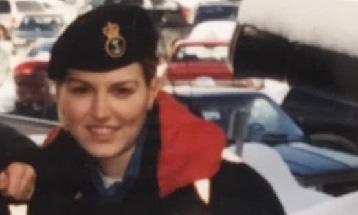Small town to high seas

Royal Canadian Navy Veteran David Berry in uniform, circa 1963.
Born in Saint John, New Brunswick, and raised nearby in the small town of Pamdenec, Dave was the eldest of four children. At 16, he joined the Canadian Navy Reserves at HMCS Brunswicker, a land-based Naval Reserve Division in Saint John. The next year, in 1960, he joined the Navy before finishing high school to help support his family.
After training at HMCS Cornwallis in Nova Scotia, Dave was selected for the Radioman Special Trade (which later became Communicator). Over the next 21 years, he served across Canada and abroad.
He did four tours in Alert, Nunavut, and was posted to three different ships: HMCS Margaree for a year, HMCS St. Croix for close to three years, and the frigate HMCS Jonquière for a year.
At sea, Dave visited a number of ports on the west coast. He also journeyed as far as Acapulco, Mexico, and Pearl Harbor, Hawaii.
“I really enjoyed the work,” Dave remembers. “It was fascinating and secretive. We got to see what was going on in the background.”
To aid with the translation aspect of the work, Dave took foreign language training while stationed in Ottawa.
Going forward, looking far back

Dave Berry at Old Orchard Beach, Maine.
After Dave Berry released from regular service in 1981, his journey took him not so much away from the military, but rather into a new specialty field.
“There was no real difficulty making the transition to civilian life, as I discovered a second career every bit as rewarding as the military life,” he says.
“The military was offering something called Project Loyalist when I got out, and I went to Loyalist College in Belleville, Ontario for a year and earned an accounting degree. While at college, I took one computer course, and that sealed my fate, as I was bitten by the IT bug.”
Release from service also gave Dave the opportunity to complete a common milestone: his high-school education, which he had dropped at age 17. Despite the skills and experience he gained over 21 years in the Navy, several doors remained closed to him in his post-service career.
“I applied for a job as an air-traffic controller. Even though I scored highest in Canada on the exam, I didn’t get the job because I didn’t have a high school diploma.”
After earning his Grade 13 diploma through adult education, those closed doors opened for him.
Dave settled in Ottawa in 1983, and continued his education in IT, learning programming, designing computer equipment, and finally transitioning into a new career. He became a full-time reservist providing a range of IT services to the Department of National Defence, and worked for other federal departments and agencies, as well as Telesat Canada and other clients.
After eight years as a reservist, Dave set up his own company and became a full-time IT consultant. And throughout his post-service career, he continued to take courses to advance his knowledge in the fast-changing IT field.
Not slowing down in retirement

Dave Berry with Joyce.
Over the years, travel has remained an important part of Dave’s life. He and his wife, Joyce, take regular trips to warmer climes, and travel frequently to New Brunswick, where Dave’s siblings still live.
Dave retired fully in 2009 at age 66. One of his fondest memories came two years later, when he and Joyce celebrated retirement by taking a driving trip with another couple along the Alaska Highway from Edmonton, Alberta, to Fairbanks, Alaska.
Community service is important to Dave. He served as a member of the Fallingbrook Community Association in Ottawa from 1985 to 1993, and received the Orleans Citizen of the Year award that same year. He also received an award from the Canadian Red Cross for donating blood more than 150 times.
To continue his self-improvement, Dave participated in the health and wellness program from Mission VAV, an organization that helps Veterans adopt healthier lifestyles while building connections with the Veteran community.
And for over 20 years, he has been researching genealogy. He has found over 500 ancestors and family members, and even learned that he is related to Canadian Prime Minister and Father of Confederation, Charles Tupper.
It will be fascinating to see what new directions Dave Berry explores next.
Mission VAV has received funding from the Veteran and Family Well-Being Fund.



